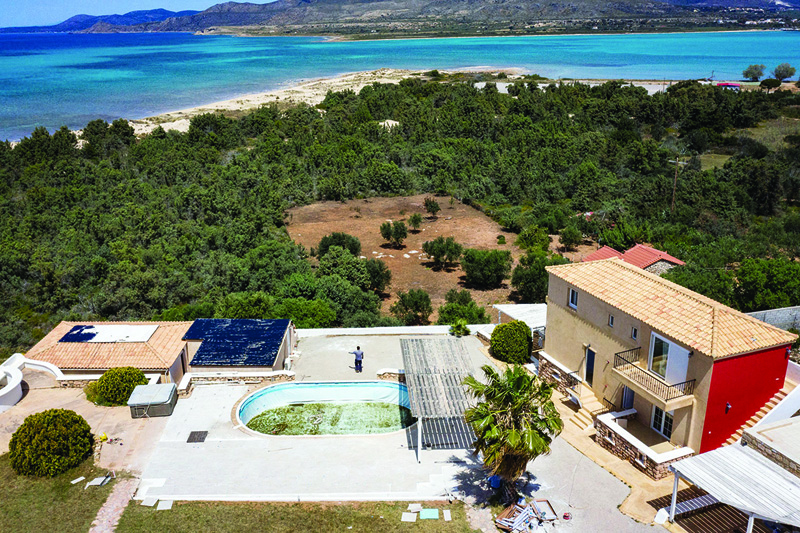 A photo shows a view of a hotel under renovation on the small southern Greek island of Elafonisos. - AFP
A photo shows a view of a hotel under renovation on the small southern Greek island of Elafonisos. - AFP
White sandy beaches make Elafonisos a popular holiday destination but it's the Greek island's small population that puts it top-of-the-list for COVID jabs as the country pushes to restart tourism before summer. In January, the Greek government said it would prioritize immunity on smaller islands, promising they would be fully vaccinated by the end of April. To that end, jabs are being distributed to inhabitants of dozens of islands in the Aegean sea to the east and the Ionian sea to the west, where municipalities are hungry to reopen fully to tourists next month.
"Seventy percent of the island's population will be vaccinated before mid-May," says Elafonisos mayor Efi Liarou, a move she said would "provide a kind of shield for the inhabitants." "It's a very important step that guarantees the launch of the tourist season and sends a message of optimism," she continues, proud of what she sees as her island's "COVID-free identity". Seated outside the island's vaccination centre, Panagiotis Aronis, 70, awaits his turn to receive his second COVID jab. "The sky is clear, the process is going well," he says, casting his eyes to the blue above him. "With a little luck we will all be able to survive," Aronis muses.
Jabs by ferry
Parked outside the center is a medical truck stacked with special boxes full of COVID-19 vaccine doses. Doctor Anargyros Mariolis, in charge of vaccination on Elafonisos, escorted the truck from the mainland by ferry on Friday. And after finishing a day of giving jabs at the centre, Mariolis begins visits to home-bound elderly residents. "Our goal is to create a wall of immunity to get back to normal as fast as possible," he tells AFP. The jab campaign is completely voluntary and doesn't apply to anyone under the age of 18.
Nevertheless, Mariolis hails as "exemplary" the deployment of "Operation Freedom"-as Greek health authorities have dubbed it-echoing the optimism of the health ministry's secretary general Marios Themistocleous. "Soon we will have finished vaccinating on islands with fewer than 1,000 residents," Themistocleous said last week while inspecting efforts on the island of Irakleia. "We will then accelerate our efforts on the bigger islands," he said.
Measuring just 18 square kilometers (7 square miles), Elafonisos lies just off the Peloponnese peninsula and welcomes an average of 200,000 tourists every year-but that number was decimated by the pandemic in 2020. The third wave of the pandemic has hit Greece particularly hard with the majority of the country's nearly 10,000 virus deaths occurring over the last few months.
"We're going to make it"
Greece has been under virus restrictions-including a curfew of varying strictness-since November. But like other tourism-dependent Mediterranean economies, Greece began to re-open non-essential businesses and schools in early April, while restaurants and cafes are set to offer outdoor seating on May 3. One week ago, Greece lifted a mandatory seven-day quarantine for travellers from European Union countries, the UK, the US, Israel, Serbia and the United Arab Emirates, with tourists required to provide proof of vaccination or a negative COVID test.
On Monday, US operator Delta Airlines said it would resume flights to Greece via New York on May 29, and add a direct flight from Atlanta on July 3. Local business people on Elafonisos are counting on their image as a safe haven from the virus to help draw their customers back. "The COVID-free identity is a privilege for our island," says Chryssoula Kataga, 43, who owns a restaurant in the island's port. "It reassures tourists after this whole period of confinement," she said. Babis Aronis is finishing renovations on his hotel nearby and says he's already started getting calls for reservations. "After May 14, everything will be better," he says. "We're going to make it this summer." -AFP
.jpg)



